- People Seeking Help
- Books Menu
- Alexander Boyd's 1
- Alexander Boyd's 2
- Alexander Boyd's 3
- Alexander Boyd's 4
Records and Recollections of Alexander Boyd & Co. Ltd.
The Inter-War Years
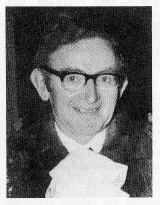 The coal business had come to stay. Started in
1921 the business was built up rapidly, annual purchases in 1922 being
around 1,500 tons. In 1924 a derelict garden behind Castle Buildings
yard was purchased for £100. This had been in the possession of the
Johnson-Smith family of Ingram and had been at one time the kitchen
garden for a hotel in Cross Row. Now it was cleared and in the following
year corrugated iron coal sheds were erected by W. j. Law & Co. This
meant that coal stocks could be built up in the slack summer months to
meet the increased demand in the winter time.
The coal business had come to stay. Started in
1921 the business was built up rapidly, annual purchases in 1922 being
around 1,500 tons. In 1924 a derelict garden behind Castle Buildings
yard was purchased for £100. This had been in the possession of the
Johnson-Smith family of Ingram and had been at one time the kitchen
garden for a hotel in Cross Row. Now it was cleared and in the following
year corrugated iron coal sheds were erected by W. j. Law & Co. This
meant that coal stocks could be built up in the slack summer months to
meet the increased demand in the winter time.
At this time the main suppliers were John Milligen & Co., Ltd., A. S. Davidson and Evans & Rodgers, all coal importers based on Belfast. Coal was purchased generally by the wagon load. It was loaded on to the railway wagons at the coal quay in Belfast, weighed and despatched to Lisburn railway goods yard. There it was shovelled on to Boyd's lorries, brought to the coal yard and shovelled off. In the yard the coal was filled, using large graips, into scoops on weighing machines and tipped into jute bags holding I cwt 1 quarter each. Graips were used instead of shovels to reduce the amount of slack in the coal. The bags were then loaded on to lorries and delivered. The business was based on small orders mostly paid for in advance, with quick deliveries and keen prices. In 1921 household coal was being sold for 2/ 10 per bag or £2.4.0 per ton. A small advertisement appeared regularly in the local newspapers:
'Have you tried
Boyd's coals?
They'll please you'.
They certainly did. In 1923 sales had reached 1750 tons and in 1925 almost 1900 tons.
The year 1926 brought the national coal strike. Starting on 1st May, 1926 it dragged on all summer and ended on 26th November. What effect did this have on Boyd's? Prior to the strike coal was received mainly from Lancashire and Yorkshire coal fields and also from Lanarkshire. On 1st May 1926 32 tons of Arley coal in five wagons was received from Alexander King of Belfast who, along with the Antrim Iron Ore Co., Ltd, were at that time Boyd's main suppliers. The cost was £1.18.0 per ton plus the cost of carriage from Belfast. This was the last consignment of English coal to come until after the strike ended but, during the strike nearly 350 tons of coal were received from all sorts of places. First to arrive was a wagon of eight tons of French coal noted as "very poor" and costing £2.5.0 per ton. This was followed by Silesian coal, more French coal, Westphalian coal, American coal and some more anonymous consignments just labelled "foreign". John Kelly sent fifteen tons of "Brown Fuel" in October costing £3.12.0 per ton by this time scarcity had pushed the price up and had made consumers somewhat less discriminating. Also in October 6 tons of Arigna slack from Co. Leitrim was received per the Antrim Iron Ore Co., Ltd. Incidentally this company was originally engaged in mining iron ore in the hills north of Larne but, by this time, their principal activities seemed to be shipping and coal importing. In a contemporary advertisement pride of place was given to the statement, "Importers of the celebrated 'Brown Ash'- the Komfort Kole". The company obviously subscribed to the theory that the wrong spelling was in some way indicative of good quality. Alexander King, Ltd, mentioned earlier, had Lisburn connections, the family living for some time in Seymour Street.
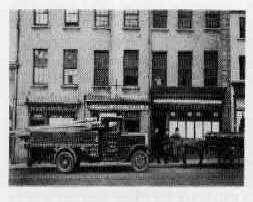 |
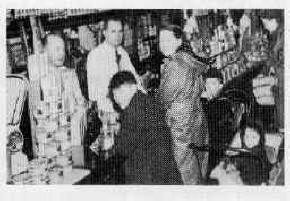 |
| The old Castle Street shops just prior to demolition | Interior of Grocery Department 1950 |
In due course the strike ended and business was soon back to normal. In 1931 for the first time sales were over 3,000 tons. Four men were permanently employed with seasonal additional help. James Abbott was the senior man until his retirement in 1958 and Rosman Hull was, from 1929, the second driver. These two gentlemen, for no other word as aptly describes them, were quite exceptional people. Quiet hard-working men of tremendous character, they were looked up to not only in Boyd's but also in the communities in which they lived. J. G. Hanna and his two drivers had a mutual regard for each other that was to remain unbroken until death in the course of time took its toll. I am glad that I knew them for to me they gave to the word 'dignity' a new meaning and I learned that a man's worth could be assessed in some other way than by reference to the money he had or the position he held.
In spite of strikes, unemployment and the world recession of the 1930's business in the three departments of Boyd's continued at an even pace. James J. Moffatt, the Grocery manager, retired on 1st January, 1938. Prior to that he had been off work for a year through ill-health and after he left he worked on his own behalf in a small way but died in 1940. He was succeeded by Tommy McClatchey who had joined the firm as a young man in October, 1919. He was to control the affairs of the department most efficiently for the next thirty years. In 1939 'Chatty' Wilson, or rather Miss Charlotte Mussen Wilson, retired in February with the good wishes of the staff and a silver rose-bowl to mark her thirty-eight years service. Her successor was Sadie McMillan who came from Glasgow's, a large shop in Newtownards. She was an altogether different sort of person from Chatty Wilson, and ruled the office with ruthless efficiency. She was not given to suffering fools gladly and any girl falling short of her high standards either had to improve fairly rapidly or go elsewhere.
William H. Rose who came as an assistant to the Grocery on fifth April, 1932 recalls what life in Boyd's was like in those days:
"I came to Boyd's in 1932 and commenced a very happy and pleasant fifteen years. The Managers were Mr. Moffitt, Grocery and Mr. Corrie, Pharmacy. Most of the staff were there many years before me. Mr. McClatchey, Mr. Getgood, Miss Maze and Miss A. Allen. In charge of the office was Miss Wilson who was held in very high esteem by the staff and also any others that came in contact with her. In the coal yard there was Jimmy Abbott who was what I would call the senior man. He resided in apartments at the top of the building and acted as caretaker.
"As I mentioned most of the staff were there before me and were still there when I left' fifteen years later to take up a position as Commercial Traveller with Crosse and Blackwell. At that time they only did business with the high-class shops of each town, Boyd's being Lisburn's only call. The long service of Boyd's staff points out the good relations between staff and management.
"The 'Cut-price' shops which are too numerous today, at that time there were only two in Lisburn. Boyd's had the quality goods and enjoyed the custom of the Upper-class but Mr. Hanna made no class distinction as regards, customers. Everyone was welcomed with a friendly smile and a kind word or two m appreciation of their business.
"The Grocery staff in those days were not just handing out packed goods and taking the cash. Most items had to be weighed and packed and you had to know the quality of the goods you were selling. Boyd's had a great reputation for `Tip Top' Tea. Every Monday six or seven large chests of tea had to be weighed up into packets. Also seven or eight 2 cwt bags of sugar were weighed up and butter too. There was none of your pre-packed bacon. It was cut fresh for each customer. Coffee was ground fresh too and was so popular that when customers went to other parts of Ireland, or even England and Scotland they wrote and asked to have it sent to them paying the postage. I doubt if this would be economical today with the postage charges.
"In 1934 there was a 'Lisburn Shopping Week' arranged by the Junior Chamber of Commerce. There was a window dressing competition and Mr. McClatchey, who was in charge of all the twelve windows gave me the opportunity of trying my hand at one of them. I got from Finlay's, the soap makers of Belfast a square of Queen's Pale soap, weighing 1/2 cwt. and also some very large candles. Together with soap powders and other household products for cleaning I made my window display. That evening the phone rang to say that one of our windows had won the cup. It turned out to be mine. Mr. Hanna's remark was 'It's a case of the pupil beating the master'. After that I was put in charge of all the windows arid won many more prizes.
"Everything kept going smoothly, peace, love and harmony prevailing until 1939 when two major disasters happened. In July I was rushed to hospital for my first and only occasion (thank God) with appendix trouble. I had had the pain for three days and Miss Lenaghan in the Medical Hall tried every known cure. On the Friday after the 'Twelfth' I went from the shop down to Dr. Johnston and he said it was an immediate operation not even allowing me to go home. At that time we paid a penny each week which entitled you to free hospital treatment and I must say that the attention given in the County Antrim Infirmary could not have been better, from the Matron, Miss Wilson, down. During my stay in hospital a new bonus scheme was started in Boyd's. It was a good tonic when Mr. Hanna called at the hospital to see me and handed me an envelope containing my first bonus.
"The second disaster was the war. Eventually ration books were introduced. As far as I can remember the ration was 1/4 1b. of sugar, 1 egg, 2 oz. tea, 1/4 lb. Bacon and 1/4 lb. Butter per week and all other Grocery items were in short supply. Sometimes customers left thinking they might get more elsewhere but at the next re-registration they would be back remarking that they could not have been treated better or fairer anywhere else. I would like to point out at this stage that every six months returns had to be made of all the surpluses of rationed goods. I am told that it was the practice of many to sell these surpluses on the Black Market but Mr. Hanna stressed the point that full stocks must be returned to the last ounce. I would say that straight forward honesty and the desire to do a good day's work regardless of the reward stood me in good stead for my next job and I still have the excellent reference from Mr. Hanna which included the statement that there would always be my old job to come back to. When the business was sold, although I had left 28 years, I still had the very sad feeling that the great grocery firm of Alexander Boyd's was no more".
The three old shops in Castle Street that were acquired from Dr. Musgrave in the original purchase were in pretty poor shape by the 1930's. They were small, cramped three Storey buildings and, in 1937, they were demolished to make way for the present three shops and dental surgery. The contractors were James McNally & Sons Ltd., of Bachelors Walk and the cost was £ 1,804. Sadly during the demolition a wall collapsed and fell on one of the workmen who was killed. Prior to the re-building the three shops were occupied by W. J. Connolly, a newsagent, by J. Warwick who had a pawn shop, the Castle Loan Office, complete with the sign of three brass balls, and No. 7 was a fruit shop. Mr. Connolly took up the offer of a tenancy in one of the new shops but the others did not do so and the two shops were let to the Castle Dye Works and to Sidney Moore as a Gents' Outfitter. The dental surgery was let to W. J. Chapman.
The Second World War and the End of an Era
The second world war commenced in 1939 with hardly a ripple on Boyd's private sea. J. G. Hanna gave up most of his outside interests to concentrate his energies on his business. Amy Rogan left the office in 1941 for the Food Office which controlled rationing at a local level. Also in 1941 R. Greer left the Grocery for munitions work and in 1942, John A. McNeill, a chemist, left to join the R.A.F. A store behind No. 9 Castle Street was used as an Air Raid Precautions store. There were many troops stationed in Lisburn from 1940 to 1944 including the second Lord Birkenhead, who was an officer in the Oxford and Bucks Light Yeomanry. Lady Birkenhead was a regular customer. Also among the troops was Fusilier R. Smartt of the Royal Welsh Fusiliers who found time away from his military duties to climb the wall and break into Castle Buildings. Here he was discovered by Jack Kennedy, the Pharmacy dispenser, who lived on the premises. He arrested the intruder and handed him over to the police. Afterwards the following letter was received:
SUBJECT:- The King v. Fusr. Robt. Smartt 6th R.W.F.
R.U.C., Lisburn,
18 Jan, 1940
Dear Mr. Hanna,
I wish to bring to your notice the good work performed by your Mr. Kennedy in effecting the arrest of the above named in the early hours of 30th ult, when he had broken and entered the premises of your firm.
We in the Police-realise that Mr. Kennedy acted with courage and promptitude in dealing with this law-breaker. This soldier is being dealt with by his own Authorities. I would be grateful if you would bring our appreciation of Mr. Kennedy's conduct before the other Directors of the firm
Yours sincerely,
W. F. Creery
D.I.
On two occasions in 1942 coal was received via the Lagan canal. In May 73 tons arrived on the lighter "Lagan" and in September 80 tons on the lighter "Maul". These are the only nautical ventures on the part of Boyd's on record although some ten years later the possibility of bringing all coal by lighter was examined and rejected on economic grounds. Shortages and rationing were the principal 'Head-aches' in those days but still on the premises are the buckets of sand and water, the stirrup pump and a special long handled shovel designed to deal with incendiary bombs, reminders that air-raids were always a possibility.
Rationing continued well after the war was over and included eggs, fats, cheese bacon, sugar and tea. A great many other food items could only be obtained with 'points' a flexible form of rationing. Petrol was rationed, the purchase of matches and candles was restricted. Cigarettes, sweets and razor blades were in short supply. There were no bananas.
On the credit side in 1941 the Duke of Abercorn, Governor of Northern Ireland transferred his patronage from the Bank Buildings Grocery department in Belfast to Boyd's. Boyd's were officially appointed suppliers to the Duke and thus began an association with Government House which was to remain unbroken until 1973 when the office of Governor was abolished and Lord Grey left the province. On two occasions presentation boxes of chocolates were specially manufactured for Boyd's by Rowntree's and presented to Government House for use during royal visits.
In 1947 J. G. Hanna judged it prudent to have someone in the business to succeed him in due course and, in the best nepotic tradition, looked no further than his son-in-law. So, on 1st January, 1948, I joined the Company and, on 19th February, 1948, became a director.
From my point of view this would be the point in time at which to end this story but there is a better point later on which I hope to reach without turning the story into an autobiography.
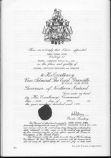 |
| One of the Warrants of Appointment |
The next few years were the most successful in the company's history. Restrictions on supplies were being gradually eased, resulting in more goods being available for sale. The National Health Service, commencing in September, 1948, produced a phenomenal increase in the dispensing of prescriptions. Demand for shops was considerable and rental income rose year by year. There was a considerable increase in staff to cope with the additional business. At Christmas, 1955 there were four girls in the office and five men in the coal yard. There was a staff of nine in the Pharmacy and seventeen in the Grocery-a total staff including J. G. Hanna and myself of thirty-seven, the highest in the history of Boyd's, The staff participated in the success of the firm to some extent. Wages were not astronomical but the annual bonus paid was a rather bigger proportion of the profits than that distributed to the share-holders.
These were halcyon years. The dispensing side of the business was one of the biggest in the province, sales for example, of frozen foods in Boyd's roughly equalled sales in all the other shops in Lisburn combined and Boyd's was recognised far and wide for the range and quality of its wares. One local grocer summed it up by saying, "I'm fed up saying, No, but you can get it in Boyd's", and he sent his son to Boyd's to be trained. Tea and coffee were sent as far afield as France and Germany, enquiries for 'Electric Balm' a remedy for muscular pains were received from Nigeria and one Christmas Eve over twenty-five gallons of double cream were packed in cartons and sold over the counter.
However times change and already the coal business was causing problems, Inflation, even at the comparatively slow rate of the 1950's could only he combated by automation but Boyd's coal trade depended on manual labour. The problem was to reduce handling costs and to increase profitability, The profit margin per ton was controlled by the Ministry of Commerce and this had a squeeze effect on profits. In 1948 wages were £1,078 and the gross profit £2242. By 1955 wages were £1,766 an increase of 64% but the gross profit at £2,889 was up by less than 29%. There were three ways that Boyd's could reduce handling costs. By moving the yard to the railway and tipping coal directly into the coal bins, by bringing coal already bagged by lorry from Belfast or by installing automatic loading equipment in the yard. All were carefully considered and all were rejected. The latter would have produced no worthwhile saving in handling costs, to move the yard to the railway would have entailed heavy capital expenditure and increased the difficulties of supervision, an important factor in the coal trade, and to draw coal bagged from Belfast economically would have required bigger lorries, too big to negotiate the narrow entrance to the yard.
On top of all this the two stalwarts of the coal yard, James Abbott and Rosman Hull, were getting to the age when less onerous work would be desirable. Indeed James Abbott was working only part-time from April 1956. By this time the decision to sell the business had been taken and, in September, 1956 it was transferred to the East Downshire Steamship Co., Ltd. of Dundrum who had a yard in Graham Gardens, Lisburn. The transition was made as smoothly as possible and orders for coal were still accepted in Boyd's.
James Abbott and Rosman Hull continued to work for Boyd's in the Grocery store and driving a delivery van. James Abbott finally retired on 91st March, 1958. By this time he had left the flat in Castle Buildings and was living in Wallace Avenue.
He died in August of that year. Rosman Hull continued to drive one of the grocery delivery vans until 20th January, 1960. On that day he was collecting a consignment of canned fruits at the docks in Belfast. At the traffic lights on Corporation Street he did not move off with the green light and the driver of the car behind him got out to remonstrate with him but Rosman Hull was beyond remonstrance. He had died as he sat waiting at the lights.
The coal yard became a carpark but the sheds are still there as is the little office where on a coal burning stove was brewed the strong sweet tea that the men drank from jam jars in the tea-breaks as, sitting round the fire they settled the affairs of the world.
One interesting fact that emerged during the last years of the coal business was that a wagon of coal nearly always weighed less when it was weighed in Lisburn than it had weighed in Belfast. Did it evaporate, were the weighings wrong, was it stolen? The answer was never found but the Railway always accepted liability albeit reluctantly. All along the track were workmen's huts with brightly burning stoves. Then there was the case of Thomas William Woods, an eighteen year old lamplighter who on 5th April 1954 was fined £2 for stealing 2/6 worth of coal from a coal wagon passing through Mays Fields. On the other hand there was a coal importer who always liked to see it raining when coal was being discharged at the coal quays. The rain, he said, was worth thousands a year to him.
The last twenty years are too recent to be considered as history but too important to be completely ignored. The business continued to flourish in a modest way and there were few incidents of particular note. One Sunday morning, 13th August, 1967 at 4 a.m. there was a smash and grab raid on the photographic window. It was broken by a brick and over £100 worth of cameras, etc. stolen. Nothing was ever recovered but this and Fusilier Smartt's abortive effort in 1939 are the only recorded break-ins in the history of the firm.
Bomb damage in due course became a problem but fortunately, so far, most of the damage has been to the windows. One window was broken in September, 1971 when the first car bomb in Lisburn exploded in Castle Street. Several other bombs caused some damage but the worst, so far, was on 30th November, 1973 when a car bomb exploded in cross row one hundred windows were broken and part of the car bumper landed on a roof to the rear of the building smashing the slates.
These were years of full employment in Lisburn and there was a constant coming and going of junior assistants. In 1950, for example, there were three new members of staff but, in 1965, there were nineteen new faces. Veni, vidi, vado! Fortunately the senior staff were more settled but changes were coming here too.
The death of W. R. Currie, that great stalwart of the Pharmacy, on 8th June,1962 is recorded in the minutes of the Company:-"No Company could have been better served than this company was by Mr. Corrie. He was a man of great integrity and was held in the highest esteem not only in Boyd's but also in the town of Lisburn ..... In regretfully recording his death we remember with gratitude his many years of faithful service".
Thomas McClatchey, the Grocery manager, died seven years later on 26th October, 1969 after a serious illness lasting several months and his death is recorded in similar terms. He came to Boyd's in 1919 and was manager from 1988 but he was much more than that and ran the business with all the zeal he would have applied to a business of his own.
There were other changes too. Sadie McMillan who ruled the office roost for over twenty years retired through ill-health in 1961. She died in 1969 leaving a substantial estate of near £20,000 to various church missions. Her successor, Gretta Roycroft, emigrated to Canada in 1971 after having been in Boyd's office for over twenty years. Kathleen Maze, after a period of part-time work, finally retired in 1972.
The old order was changing and time continued to take its inevitable toll culminating, as far as this story is concerned, in November, 1973 with the death of James G. Hanna. He had lived his whole life under the shadow of Boyd's; indeed, in the eyes of Lisburn, he was Boyd's. Countless people of all ages and classes remember with unusual affection that tall, elegant figure as he walked around supervising the affairs of his shops, greeting young and old alike with a unique blend of charm and old-world courtesy that lifted the mundane relationship of shopkeeper and customer into the realm of personal friendship. We will not see his like again-in more ways than one it was the end of an era.
It was sad but appropriate that the death of J. G. Hanna should coincide more or less with the disposal of the grocery business. The rise of the supermarket system of retail distribution created insoluble problems for Boyd's. The trouble was that the traditional over-the-counter system of shopping was time consuming and expensive for the customer and shop-keeper alike. Boyd's reputation was built on the quality and variety of its wares and the friendly and co-operative attitude of the staff. On none of these counts could the supermarkets compete but the truth of the matter was that, although the public appreciated the atmosphere and service of the old-style traditional system, the price of goods more and more became the over-riding factor. Various ways of reducing the cost differential were tried with at least some success and various proposals for conversion to a self service system were examined, costed and rejected - the space available was too small and there seemed little prospect of an adequate return on the additional capital involved.
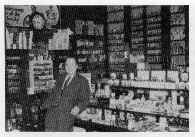 |
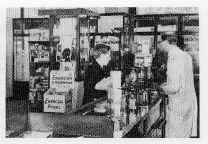 |
| Interior of Pharmacy prior to modernising and Mr. T. McClatchey then Grocery Manager. | The modernised
pharmacy and Mr. Walter Collins Director in charge |
Reluctantly it was decided to dispose of the business and, in May, 1973, it was transferred to J. T. Green & Sons of Bow Street, Lisburn. Several members of the staff went with the business to Green's and most of the others went to other local shops. A nostalgic farewell dinner for the staff held in Woodlands Hotel, Lisburn brought down the final curtain.
The shop was let to Frederick Thomas, Ltd., as a toy and pram shop and all the oak and mahogany fittings, the mirror panels, ornamental gas brackets, the speaking tubes, were ripped out and replaced with modern fittings. The first and second floor stores were converted into suites of offices, the old stairs becoming an internal fire escape.
These changes did not directly affect the Pharmacy. When W. R. Corrie retired as director in charge of the Pharmacy on 1st March, 1960 he was succeeded by Walter Collins who had joined the staff on 12th April, 1954 and was in charge of the dispensary. Also in 1960 the Pharmacy was completely re-equipped with modern fittings, a new dispensary and store had been made several years earlier. Now, seventeen years later, under the expert guidance of Walter Collins, the business continues to flourish.
So we come, not to the end of a story, but to the end of a chapter, for history is still being made and the story of Alexander Boyd and the business he started goes on. Maybe another chronicler at another time will make a better job of the next instalment.

